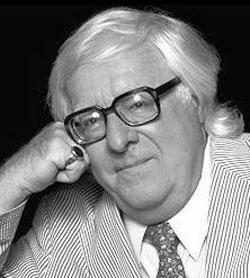Science fiction is a genre of writing I visit only occasionally. I believe it is due to my aversion to strangely-spelled and overly-punctuated names of people and places. It is difficult for me to read through inventions like Q’aaqe and Agre’br without having to stop and sound out those beastly names.
I readily admit to enjoying Ray Bradbury. His Fahrenheit 451 made an impression on me at an early age, although I can’t remember what made me pick it up in the first place. Ironically, in a later interview, the author said he considered that futuristic book to be his only true Science-Fiction work.
To me, that is the pleasure of reading a Bradbury story.
They aren’t so much grounded in scientific fact as they are stories of people in unusual situations, and how they react and interact. In Golden Apples of the Sun, a ship carrying astronauts implausibly lands on the surface of the sun. Bradbury makes no explanation as to how that could be possible. In his story, it just happens. And we readers continue on, buying into his illusion because of the masterful writing.
Mr. Bradbury died last night at age 91.
He described himself as a writer of fantasy, and much of which he wrote was dark, but polished in such a manner as to be elegantly unsettling. His characters ranged from dinosaurs to carnival workers, other-world aliens to tow-headed boys. He was one of the early practitioners of the type of writing that drew the label “Sci-Fi” but inhabited another corner of that arena.
Still, many of the futuristic ideas that Ray Bradbury put onto paper have come to pass, among the most commonly seen: iPods, interactive television, reality shows, and televised police chases.
He was more than just fond of television and movies. After relocating to California he incorporated screenwriting into his efforts and won an Emmy for his script for The Halloween Tree and an Academy Award nomination for the animated film Icarus Montgolfier Wright.
Bradbury provided for me a source of both envy and pride.
I can still pick up almost any one of his works, turn to a random page and passage, and read a line that I would trade most anything to have been able to conjure – because magic is what his writing seems to me.
Previous to the publishing of my first short story, the magazine editor wrote to me that he was including it “because it reminded him of Bradbury.”
It was not even close, but it was the highest flattery that editor could have given.

Leave a Reply